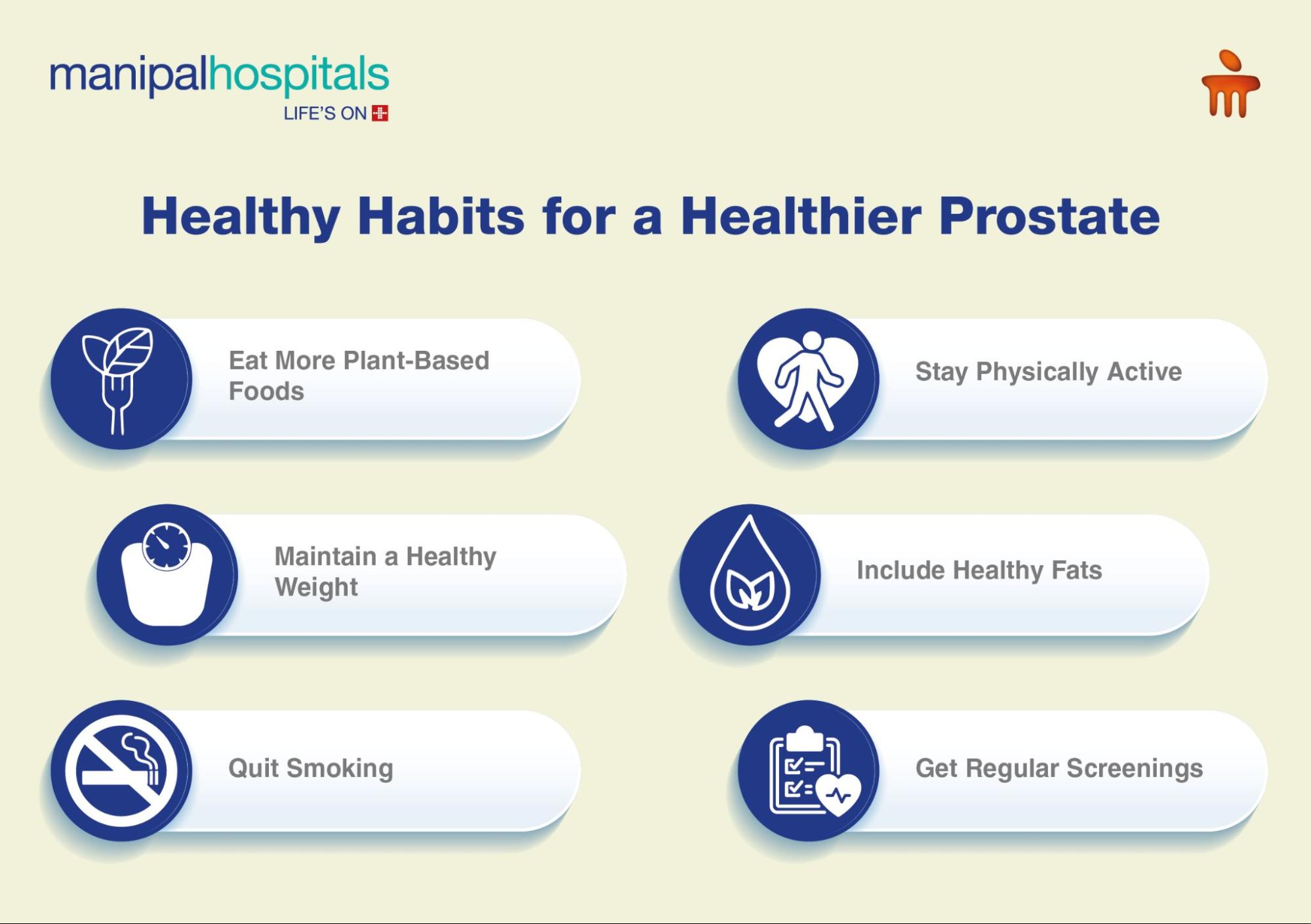
Listen to article
Loading audio...
If you're a man over 50, or even younger with a family history of cancer, there’s one important health conversation you shouldn’t avoid: prostate cancer. Though it’s one of the most common cancers in men, when caught early, prostate cancer is also one of the most treatable.
This guide breaks down everything you need to know — from prostate cancer symptoms to the latest prostate cancer treatment options — so you can stay informed, prepared, and in control of your health.
Synopsis
- What Is Prostate Cancer—and Why Should You Care?
- Early Signs: What Symptoms Should You Watch Out For?
- What Causes Prostate Cancer?
- Prostate Cancer Screening: Catch It Early, Treat It Better
- Understanding the Stages of Prostate Cancer
- Latest Treatments: From High-Tech Surgeries to Gentle Monitoring
- What’s the Outlook? Prostate Cancer Prognosis & Survival Rate
- Can You Prevent It? Yes, Here’s How
- Prostate Cancer Awareness: Why It Matters
- Get Expert Help, Right from the First Symptom
What Is Prostate Cancer—and Why Should You Care?
The prostate is a small gland that plays a big role in male reproductive health. When cells in this gland grow uncontrollably, it leads to prostate cancer. Many men don’t notice it at first, which is why prostate cancer screening is so important, especially because early-stage prostate cancer rarely causes symptoms.
But don’t panic — this isn’t a story of fear. It’s one of awareness, early detection, and better outcomes. Thanks to medical advances, the prostate cancer survival rate has improved significantly over the years.
Early Signs: What Symptoms Should You Watch Out For?
Let’s talk symptoms. Some men with prostate cancer experience no signs at all. Others may notice:
-
Difficulty starting or stopping urination
-
Frequent urination, especially at night
-
Weak or interrupted urine flow
-
Painful urination or ejaculation
-
Blood in the urine or semen
-
Pain in the lower back, hips, or pelvis
These prostate cancer symptoms may also be linked to other conditions, but ignoring them isn’t an option. If you spot any of these red flags, it’s time for a check-up.
What Causes Prostate Cancer?
While the exact prostate cancer causes aren’t fully understood, several risk factors can increase your chances of developing it:
-
Age (especially over 50)
-
Family history of prostate cancer
-
Certain inherited gene mutations
-
Obesity
-
African or Caribbean ancestry
Knowing your risk is the first step toward prostate cancer prevention — and it begins with a conversation with your doctor.
Prostate Cancer Screening: Catch It Early, Treat It Better
Screening saves lives. If detected early, prostate cancer can often be cured or managed with far less aggressive treatment. The two main prostate cancer screening tools include:
-
PSA Test – A simple blood test for prostate cancer that checks for elevated levels of Prostate-Specific Antigen. High levels can be a warning sign.
-
Digital Rectal Exam (DRE) – A physical exam where a doctor feels for abnormalities in the prostate.
Screening recommendations vary, but most experts suggest discussing prostate cancer screening by age 50, or earlier if you have risk factors.
Understanding the Stages of Prostate Cancer
The stage of prostate cancer tells us how advanced it is and guides treatment options. The main prostate cancer stages include:
-
Stage I: Small, slow-growing tumour limited to the prostate
-
Stage II: Larger but still confined to the gland
-
Stage III: Spread to nearby tissues
-
Stage IV: Advanced cancer that has spread to other organs or bones
The earlier the stage, the better the prostate cancer prognosis. That’s why timely testing is so critical.
Latest Treatments: From High-Tech Surgeries to Gentle Monitoring
There’s no one-size-fits-all approach to prostate cancer treatment. Your care plan depends on the stage, your age, and your preferences. Here’s what’s on the table:
-
Active Surveillance: Best for low-risk cases — regular monitoring without immediate treatment.
-
Radiation Therapy: Targets and destroys cancer cells using high-energy rays.
-
Hormone Therapy: Reduces hormone levels that fuel cancer growth.
-
Chemotherapy: Used when cancer spreads outside the prostate.
-
Prostate Cancer Surgery: Also known as prostatectomy, robotic and minimally invasive options now offer faster recovery.
-
Immunotherapy & Targeted Therapy: Cutting-edge solutions for aggressive or resistant cancers.
Today’s prostate cancer treatment is smarter, more precise, and more patient-friendly than ever before.
What’s the Outlook? Prostate Cancer Prognosis & Survival Rate
The good news? The overall prostate cancer survival rate is excellent, especially when diagnosed early. Most men with localised or regional disease have a nearly 100% five-year survival rate. Even in advanced cases, modern medicine offers multiple paths for management and long-term quality of life.
Can You Prevent It? Yes, Here’s How
While you can’t control genetics, you can lower your risk through simple lifestyle changes. Here are some effective prostate cancer prevention tips:
-
Eat a balanced, plant-rich diet
-
Stay physically active
-
Maintain a healthy weight
-
Avoid smoking and limit alcohol
-
Don’t skip your prostate cancer test — even if you feel fine

Prostate Cancer Awareness: Why It Matters
Raising awareness about prostate cancer symptoms, risk factors, and the benefits of early prostate cancer screening can save lives. Whether it’s encouraging the men in your family to get checked or sharing information during Prostate Cancer Awareness Month, every conversation counts.
Get Expert Help, Right from the First Symptom
At our hospital, we don’t just treat cancer — we treat people. Our expert team includes urologists, oncologists, and robotic surgeons who work together to design the most effective prostate cancer treatment plan for you. Whether it’s early detection with a PSA blood test for prostate cancer, advanced prostate cancer surgery, or post-treatment care, we’re with you at every step. With personalised care, modern facilities, and a commitment to your long-term health, you’re in good hands.
FAQ's
Not always. Many cases of prostate cancer are slow-growing and may never cause symptoms or complications. That said, some types are aggressive. Early prostate cancer screening helps determine which path the disease is taking, allowing your doctor to recommend either monitoring or active prostate cancer treatment.
A family history of prostate cancer significantly increases your risk. If your father or brother was diagnosed, especially at a younger age, your chances of developing the disease nearly double. In such cases, early prostate cancer screening, including a blood test for prostate cancer, is highly recommended.
According to most guidelines, men should begin discussing prostate cancer screening with their doctor by age 50. If you are at higher risk (due to family history or ethnicity), start that conversation by age 45 or even 40. Screening includes both the PSA blood test for prostate cancer and the digital rectal exam.
Yes! A diet rich in fruits, vegetables, whole grains, and omega-3 fatty acids may help reduce the risk of prostate cancer. Regular exercise, maintaining a healthy weight, and avoiding processed meats and sugary foods also play a key role in prostate cancer prevention.
Thanks to minimally invasive and robotic-assisted prostate cancer surgery, recovery is faster than ever. Most patients are up and walking within 24 hours, with a typical hospital stay of 1–2 days. Full recovery usually takes 4–6 weeks, depending on your overall health.




















 6 Min Read
6 Min Read












